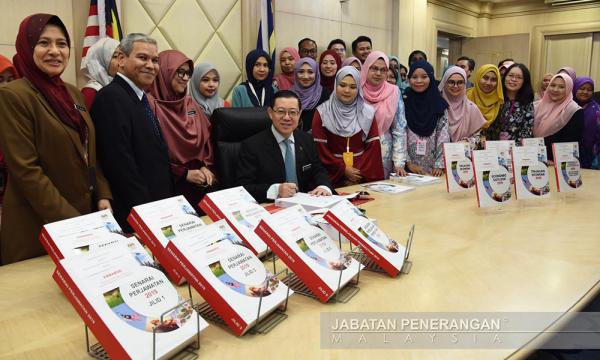COMMENT | Budget 2019, tabled by Finance Minister Lim Guan Eng in Parliament on Nov 2 offers a first tangible glimpse of the concrete policy plans that the Pakatan Harapan government has for its first full calendar year in office. The allocation of RM56.7bil towards development expenditure (DE) equates to an RM8.7 billion increase over its 2018 allocation and represents the highest absolute DE figure in federal budgets since Merdeka.
Importantly, it breaks two worrying trends seen under the Najib Abdul Razak administration between 2009 and 2018; first, of steadily declining DE allocations, and second, of an unparalleled concentration of DE within the Prime Minister’s Department (PMD). These features are depicted in Figure 1.
Prior to Najib’s tenure, the share of DE accruing to the PMD remained comfortably under a tenth. Such an arrangement indicates that the many ministerial portfolios in Malaysia are recipients of sufficient and well-balanced funding for the various developmental programmes and policies under their individual jurisdictions. Under Najib, however, many DE budgetary items that may have been better placed under the purview of the appropriate ministries were instead parked under the PMD. As a consequence, the size of the PMD bloated.
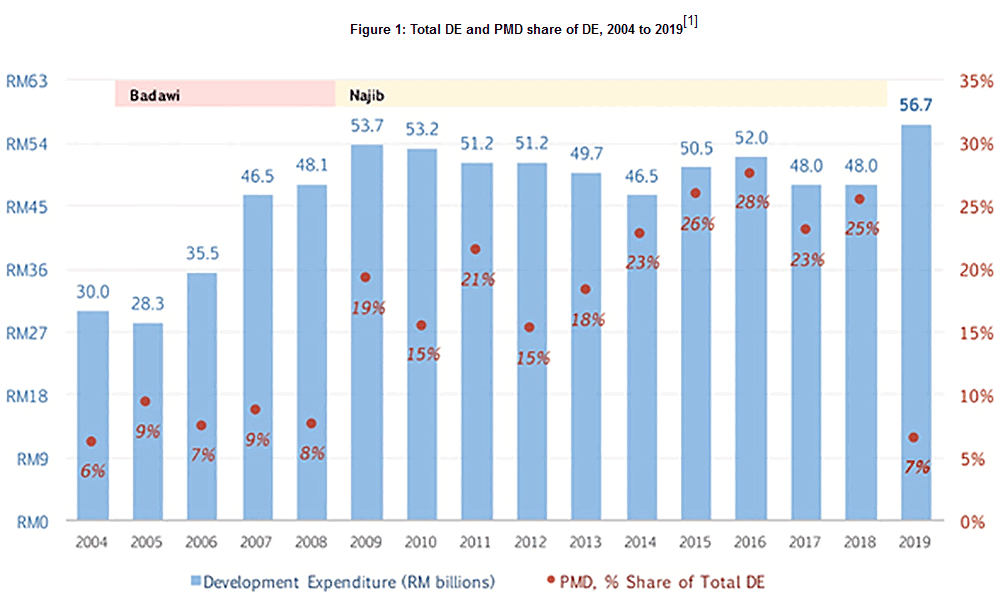
A prominent example of this is the Pan Borneo Highway (PBH), which is in every sense a public works project that should fall under the domain of the Ministry of Public Works (MOPW). Instead, RM4.3 billion was allocated to the PMD for this project between 2016 and 2018.
This consolidation of power and money within the executive branch of government is dangerous as it closes the window to transparency and sound governance and opens the door to the possibility of corruption, cronyism, and the mismanagement of funds. The case of the PBH succinctly exemplifies some of these dangers: the lucrative Project Delivery Partner (PDP) role for the Sarawak portion of the highway was in 2015 given to a little-known company controlled by Bustari Yusof – brother of then minister of public works Fadillah Yusof.
How Budget 2019 differs from past budgets
Budget 2019 marks a convincing step away from this unhealthy trend; for instance, RM2 billion in DE funding for the PBH next year has been allocated to the MOPW rather than the PMD. This is just one budgetary item in a list of 23 that have been shifted away from the PMD towards more appropriate ministries by the Ministry of Finance (MOF). This, combined with the repeal of five other PMD projects which were allocated RM3.33 billion in DE in Budget 2018, is a significant contributing factor to the striking reduction in the share of DE accruing to the PMD in the latest budget.
A breakdown of DE allocations to selected, key ministries (and the PMD) is provided in Figure 2. Two prominent features are worth elaborating upon. The first of these pertains to the PMD allocation, which as mentioned in Section I reached unchartered heights under Najib. In a sense, normalcy has resumed with the latest budget; the spending power of the executive has been drastically curtailed and now lies comfortably within the range of the other ministries analysed in this study.
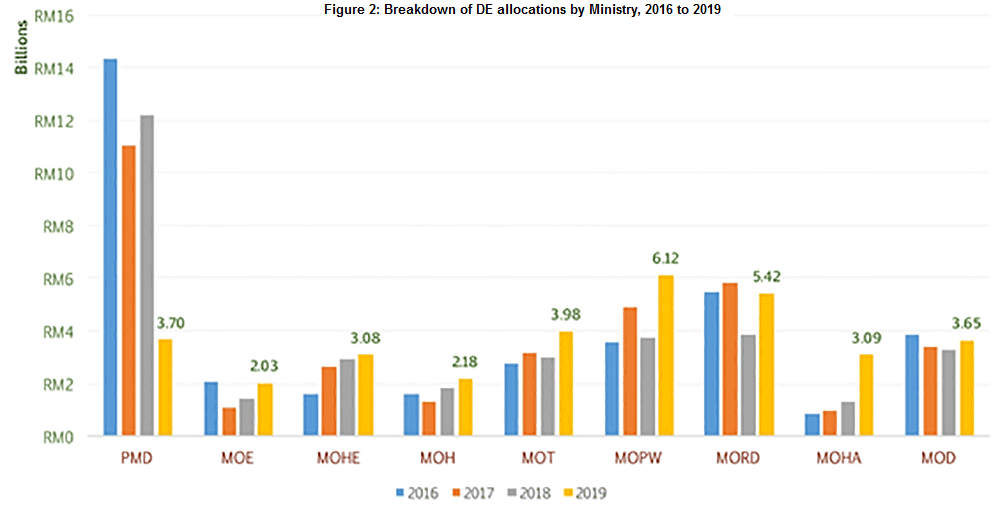
Secondly, DE allocations to the other ministries have increased and lie either at or close to their respective four-year peaks. These increases can be explained by corrections of the negative steps taken under Najib’s leadership. The first of these corrections involves the transferring of projects inexplicably placed under the PMD to more appropriate ministries.
The second factor contributing to the increase in ministerial DE allocations in Budget 2019 is the rectification of crowding-out issues which resulted from the concentration of DE within the PMD under Najib. The remaining changes in the DE allocations to specific ministries can be explained by the need for development funding based on the policies and programmes planned by the PH government for 2019.
Key Changes to PMD DE funding
The influence of the PMD on DE in Malaysian budgets over the past decade has been stark, and the bloating of the PMD’s DE budget – for purposes both constructive and destructive – is a testament to that. On a positive note, the PMD DE allocation has been slashed in Budget 2019 by almost 70% (or RM8.54 billion) relative to the average seen during Najib’s second term between 2014 and 2018, from RM12.23 billion to just under RM3.7 billion for the upcoming year. A comparison between the Budget 2019 PMD DE allocation and those of grouped time periods dating back to 2005 is provided in Table 1.
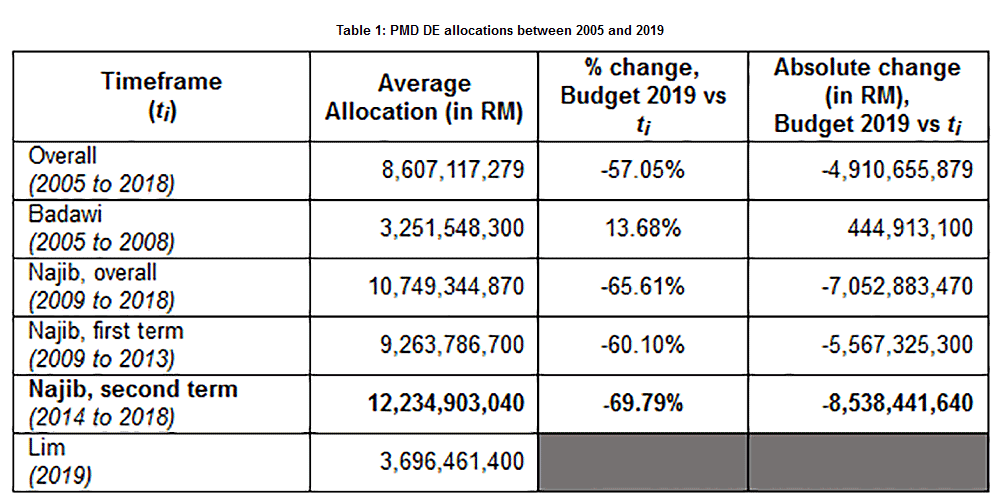
Five budgetary items previously under the purview of the PMD, which received a total of RM3.33bil worth of DE allocations in 2018, have been repealed in Budget 2019 and are listed in Table 2. Between 2010 and 2017, these five “projects” have accrued cumulative funding of RM20.62bil, almost all of which had been dedicated to the Facilitation Fund, or Dana Fasilitasi – the largest single component of Najib’s “slush fund”.
That this item has been scrapped entirely is positive news from the perspective of fiscal consolidation and anti-corruption. It is still not known what constructive purposes the Facilitation Fund served during Najib’s tenure if any. Particularly given the magnitude of DE allotted to this budgetary item over the past decade, it would advance transparency and accountability that information pertaining to the use of these funds is revealed by the MOF.

A further RM5.18 billion worth of budgetary items, as per their respective Budget 2018 allocations, have been transferred from the PMD towards more appropriate ministries. This comprises of 23 separate DE items. This is an important step for two major reasons: first, a downsizing of the PMD is a necessity given its unnecessarily gargantuan growth over the past decade; second, it makes little sense for the PMD to be intimately involved in DE initiatives when other ministries exist specifically to take on tasks that lie within their domains of expertise. A breakdown of the number of projects transferred to each ministry, these projects’ 2018 DE allocations to the PMD, and their Budget 2019 DE allocations are provided in Table 3.

Combining the formerly PMD-led DE initiatives which have been repealed or transferred to other ministries explains RM8.18bil of the reduction in the DE allocation of the PMD between Budgets 2018 and 2019. The remaining difference is derived from changes to the allocations of specific budgetary items still within the purview of the PMD, some of which have seen their allotments increase, and others which have seen theirs decrease.
What happened to Najib’s “slush funds”?
The existence of “slush fund” projects, during Najib’s tenure as both prime minister and finance minister, was first raised by the current Deputy Minister of Defence Liew Chin Tong, and contextualised in detail in a previous study on DE conducted by Penang Institute. The defining common characteristic of these projects was a severe lack of transparency, with project details not made publicly available.
What has happened with these “slush fund” projects since GE14, and more importantly, what does Budget 2019 do with them? Before analysing the arrangements made for the component projects of Najib’s “slush fund”, it is important to preface the discussion by stating that the tainted nature of these projects can be altered if the issues that led to the negative scrutiny in the first place are addressed.
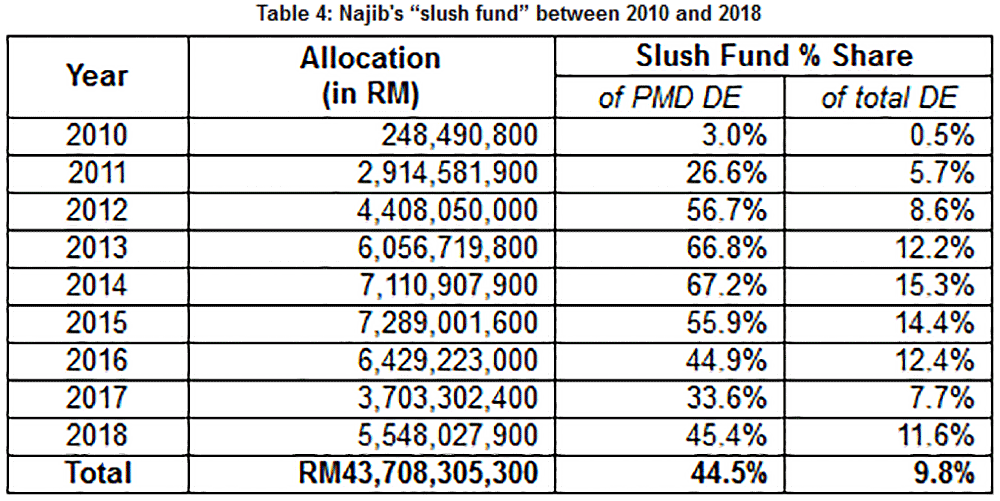
Introducing a significant degree of clarity and transparency to these budgetary items, and even rebranding them, would be steps in the appropriate direction. Most imperative, however, is ensuring that these budgetary items accomplish whatever they purport to do.

Ensuring future budget transparency
While these are encouraging developments, further concrete measures must be taken to ensure that similar episodes of misappropriation and misuse of DE funding do not reoccur and that future annual budgets strongly adhere to the principles of transparency, democracy and accountability. Most citizens are still in the dark as to what the current RM150mil allocation for ‘Special Projects’, or the RM262mil allotment for ‘Development Programmes’ truly entails, let alone if these items, and the funding they receive, indeed serve their purported purposes.
DE budgetary items – particularly those with vague project titles and large funding allotments – should be elaborated upon in detail either within, the annual budgets themselves, or separately annexed. This is important, given that the lack of transparency and accountability in Malaysia’s budgetary processes has been highlighted by the results of the Open Budget Survey conducted by the International Budget Partnership.
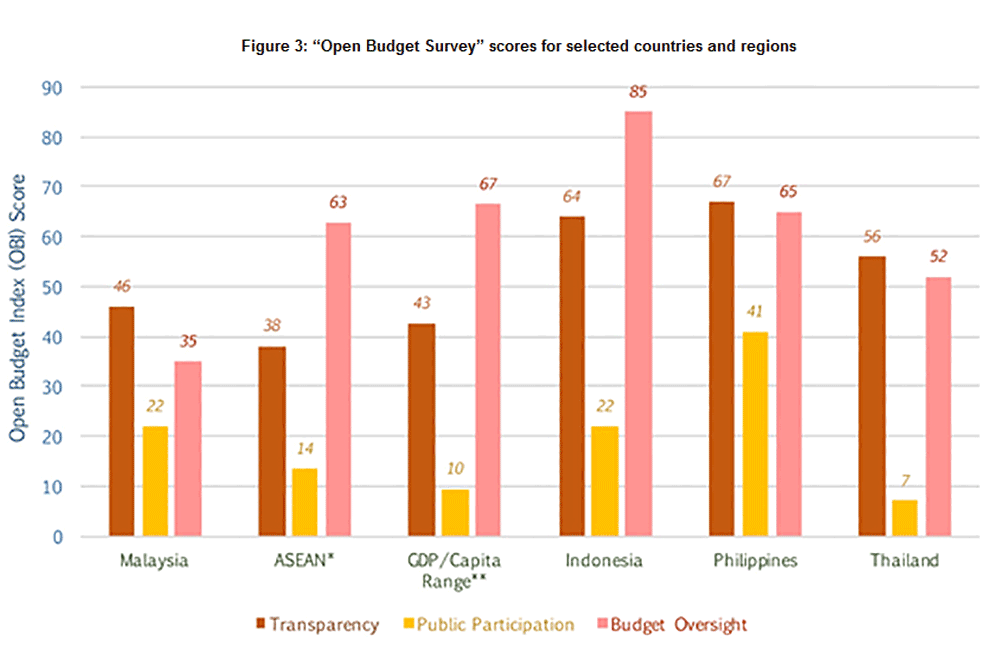
The scores Malaysia routinely achieves, highlighted in Figure 3, are far from encouraging. As of 2017, Malaysia ranked lower than Indonesia, Thailand, and the Philippines on budget transparency. With regard to budgetary oversight, an indicator of accountability, Malaysia trails the three aforementioned nations and performs worse than the ASEAN region on average, a group including countries like Cambodia, Myanmar, and Vietnam.
Annual budgets are arguably one of the most important and informative policy documents published by any government, and should ideally replicate the norms set by best international budgetary practices.
Moving forward, options to improve the transparency and accountability of Malaysia’s budgetary processes include greater detailing of individual budgetary items; the regular publishing of accounts of actual expenditures; and, the conduct of periodic revenue and expenditure reviews (such as mid- and end-year reviews). Improvements on these measures are especially important considering the fact that the incumbent PH government has openly committed to eliminating corruption and restoring previously-threatened democratic values.
DARSHAN JOSHI is an analyst with the Penang Institute.
The views expressed here are those of the author/contributor and do not necessarily represent the views of Malaysiakini.

